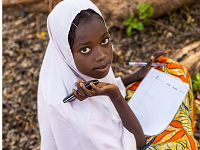The British Council in partnership with the United Nations Population Fund (UNFPA) supported by the United Nations Children’s Fund (UNICEF), the Government of Canada and the South Africa Commission for Gender Equality (CGE), calls for significant investment in education of girls.
At the webinar convened by the Mail & Guardian held on the International Day of the Girl Child the partners agreed that the many challenges facing the girls are an ongoing concern for the Africa region and that this requires a collective action with strong implementation plans to make a positive difference to the education of girls.
The barriers faced by girls and young women in Africa have led to limited access to quality education. For example, prevailing attitudes and gender norms limit girls’ access to technology (TV, radio, internet, mobile phones and computers) and this has had an impact on their learning opportunities during lockdowns.
Recent research shows that 37 per cent of girls surveyed in Uganda had no access to television and radio-based study material provided by the local Ministry of Education during Covid-19 and 50 per cent of them reported not having any home school support, while in Ethiopia, only 4 per cent of children with disabilities were enrolled in school, with boys outnumbering girls three to one in lower primary school.
“It is evident that a generation of girls and young women has been left behind and this needs to change. Girls’ education is the most powerful investment for our collective future. There is a ripple effect of this positive change when a girl gets an education; this strengthens economies, reduces inequality and creates more opportunities for everyone to succeed,” says Caroline Grant, Senior Adviser English for Education Systems and Schools Lead for Sub-Saharan Africa at the British Council.
The outbreak of the COVID-19 pandemic has negatively impacted years of progress made towards the education of the girl child. The benefits of investing in the health and education of the girl child are far-reaching, including delayed marriage and childbirth, fewer maternal and infant deaths, lower fertility rates, lower risk of HIV infection, and increased economic and political participation.
Furthermore, the socio-economic impact of COVID-19 and learning disruptions have had devastating outcomes on girls according to the British Council Girls Education Research, in the countries surveyed: Sudan, Nigeria, Ethiopia, Kenya, South Africa, Ghana, Sierra Leone, Uganda, Somalia, Malawi, Mozambique, Rwanda, Tanzania, Zambia and Zimbabwe. The research from the Connecting Classrooms for Global Learning (CCGL) Education Resilience on teachers and school leaders highlighted an increase in incidents of abuse and exploitation, both within and outside the home.
Instructional leadership and teacher training in gender sensitive pedagogy can play a powerful role in making schools safe places for girls to thrive and reach their potential. School principals must prioritise building a culture of gender equality in their schools by understanding the barriers to girls’ participation in education, such as the provision of adequate water and sanitation facilities, including separate toilets for girls and instituting a zero-tolerance policy towards school related gender-based violence.
In addition, teachers must give girls equal talk time in the classroom, modelled in the UKAid-funded Kano Literacy and Maths Accelerator project in Northern Nigeria, encourage them to take Science, Technology, Engineering and Maths (STEM) subjects, to dream big and nurture their potential.
Teachers and school leaders can also empower learners to report cases of abuse of any form, including school related gender-based violence and provide information about social services where they can report these issues.
According to the British Council, efforts towards improving girls’ education require actionable data and an acute sense of context in working with teachers, school leaders, government ministries, agencies, and harnessing the power of local communities. “We must lobby governments to support the re-entry and support for dropout learners, pregnant girls, young mothers and child labourers, including the provision of non-formal pathways. The media also have a key role to play in lobbying government and civil society for change, and this webinar is an excellent example of this. Collectively, we do have leverage and we should use it,” it said.
The British Council is the UK’s international organisation for cultural relations and educational opportunities. We build connections, understanding and trust between people in the UK and other countries through arts and culture, education and the English language.
Last year we reached over 80 million people directly and 791 million people overall including online, and through broadcasts and publications. Founded in 1934 we are a UK charity governed by Royal Charter and a UK public body. We receive a 15 per cent core funding grant from the UK government.

